Yielding powerful songs of faith, biblical worship leaders like Moses and David reveal the profound impact of music in spiritual journeys.
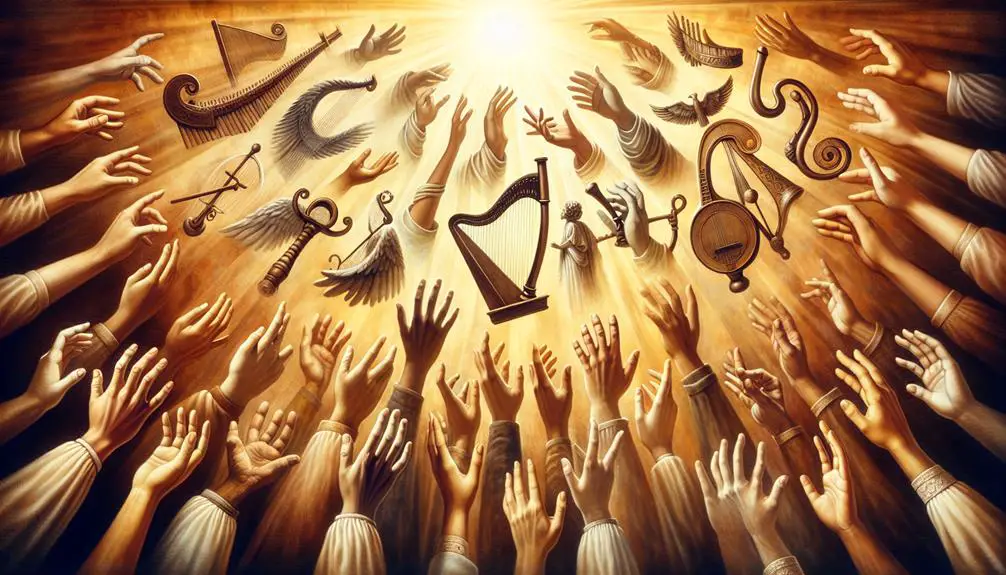
Worship Leaders in the Bible
When you think of Moses, you might not immediately picture a worship leader. Yet, he composed one of the most ancient songs of praise after leading the Israelites through the Red Sea. This act of worship set a precedent for leaders like David, Asaph, Miriam, and Deborah, who not only led people in times of trial but also in moments of musical worship.
Each of these figures brought a unique voice to the chorus of faith, demonstrating the power of song as a form of praise and communication with the divine. Uncover how their contributions continue to influence worship practices today, and you might find your understanding of biblical worship enriched in unexpected ways.
Key Takeaways
- Biblical worship leaders like Moses, David, and Miriam used music and song to deepen faith and express devotion to God.
- Worship in the Bible encompasses a range of emotions, legitimizing heartfelt expressions of joy, sorrow, and everything in between.
- Leaders such as Deborah and Asaph highlight the integration of faith, action, and leadership in shaping worship practices.
- The legacy of biblical worship leaders emphasizes the importance of sincerity, creativity, and community in religious expression.
Moses: Deliverance Through Song
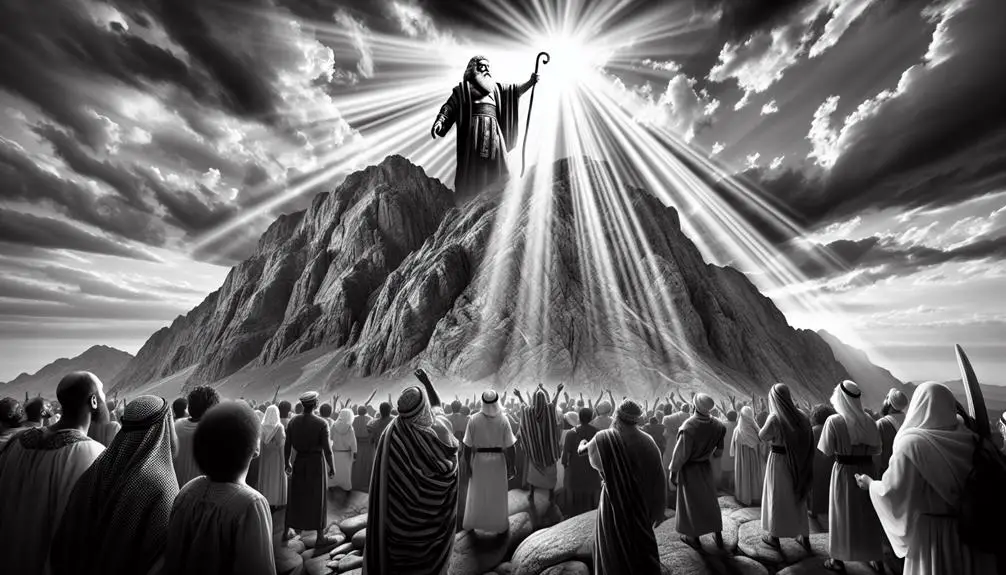
Moses, leading Israel's deliverance from Egypt, immortalized this pivotal moment through a song that not only celebrated their freedom but also served as a profound act of worship. This act, following the Red Sea crossing, illustrates Moses' multifaceted leadership qualities, intertwining spiritual guidance with tactical leadership. The song, found in Exodus 15, encapsulates Moses' ability to channel the collective emotions of the Israelites, transforming their relief and awe into a structured expression of faith.
Delving deeper, you'll observe that Moses' leadership isn't merely about guiding the Israelites out of physical bondage. It also encompasses leading them into a spiritual realization of their covenant with God. The Red Sea crossing, a miraculous event, becomes a metaphor for transition from slavery to freedom, from despair to faith. Moses, through his song, reinforces this transition, embedding a sense of divine purpose and destiny in the hearts of his followers.
Analyzing the text, one can discern that Moses' song is meticulously crafted, serving dual purposes. Firstly, it's an act of worship, acknowledging God's supremacy and benevolence. Secondly, it's a pedagogical tool, teaching future generations about the importance of faith and obedience. Moses' ability to fuse these elements showcases his exceptional leadership qualities, setting a precedent for spiritual leaders.
In essence, Moses' song post-Red Sea crossing isn't just a narrative of liberation; it's a strategic act of leadership. It encapsulates the essence of Moses' role as a leader – guiding not just on a physical journey, but on a spiritual voyage towards understanding and worshipping God. This act of deliverance through song is a testament to Moses' profound impact as a worship leader in the Bible.
David: The Psalmist King
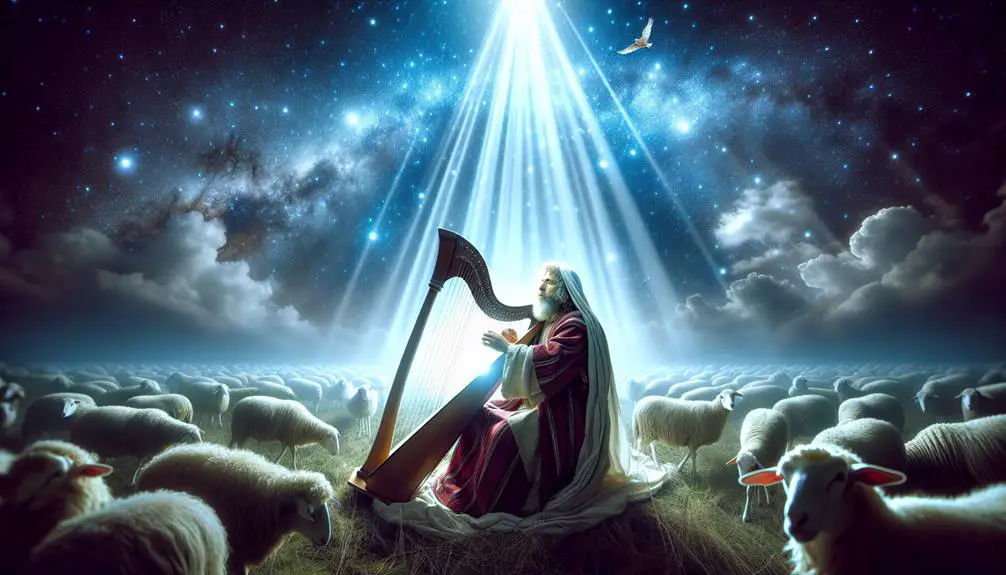
Just as Moses used song to guide the Israelites spiritually, King David significantly shaped the landscape of worship through his prolific contributions to the Book of Psalms. David's harp wasn't merely an instrument of personal solace; it served as a divine tool, intertwining worship and warfare, peace and prophecy. His musical prowess provided Saul's relief from tormenting spirits, illustrating the profound impact of worship music on mental and spiritual well-being.
David's role as a worship leader extends beyond his musical skill. His Psalms encapsulate a wide spectrum of human emotion, from deep despair to exuberant joy, thereby legitimizing the full range of human experience in worship. This emotional authenticity is what makes the Psalms so relatable centuries later. David didn't shy away from expressing doubt, fear, or anger in his compositions, teaching us that worship encompasses honesty before God, not just adulation.
Moreover, David's establishment of a structured worship order in Jerusalem set a precedent for liturgical practices. His organization of Levitical musicians and singers into divisions for temple worship underscores the importance he placed on music and its role in connecting with the divine.
Analyzing David's contributions, it's clear that his influence on worship was revolutionary. He transformed it into an expression that embraced human complexity, encouraged musical innovation, and prioritized a heartfelt connection with God. David's legacy as the Psalmist King endures, reminding us that worship is a dynamic, inclusive, and deeply personal act of faith.
Asaph: The Chief Musician
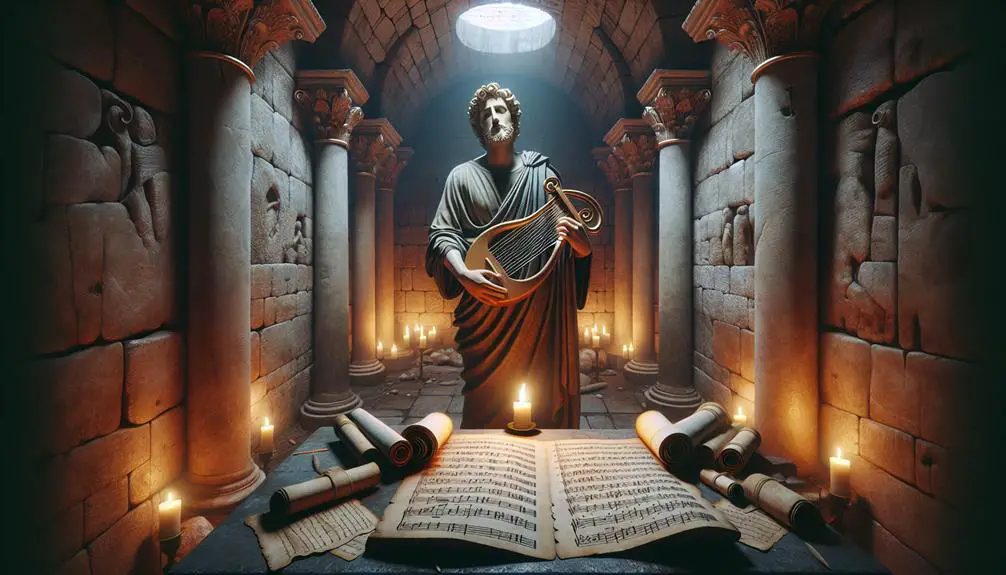
Among the notable figures in biblical worship, Asaph stands out as a chief musician, whose contributions significantly shaped the liturgical and musical traditions within the temple worship of ancient Israel. Asaph's lineage, deeply rooted in Levitical traditions, positioned him uniquely to influence the development of religious music, bridging the gap between sacred history and contemporary worship practices. His descendants, often referred to as the Sons of Asaph, continued his legacy, ensuring that his musical and liturgical innovations were preserved and propagated throughout generations.
Asaph's role wasn't merely titular; it was foundational to the establishment of a structured worship protocol. He didn't just perform; he innovated, crafting psalms that would become central to Jewish and Christian liturgies. His contributions weren't limited to composition alone; they extended into the realm of musical orchestration and choir organization. Asaph's musical innovations were revolutionary, introducing new instruments and harmonies that enriched the temple's worship experience. He understood the power of music in elevating the soul and fostering a communal sense of divinity, which is evident in the Psalms attributed to him.
Analyzing Asaph's impact, it's clear that he was more than a musician; he was a visionary who saw beyond the notes and melodies. His understanding of music as a medium for divine connection and communal expression has left a lasting imprint on religious worship. Asaph didn't just leave behind a collection of songs; he laid the groundwork for a worship tradition that would endure millennia, testifying to the enduring power of music in religious life.
Miriam: The Prophetess's Praise
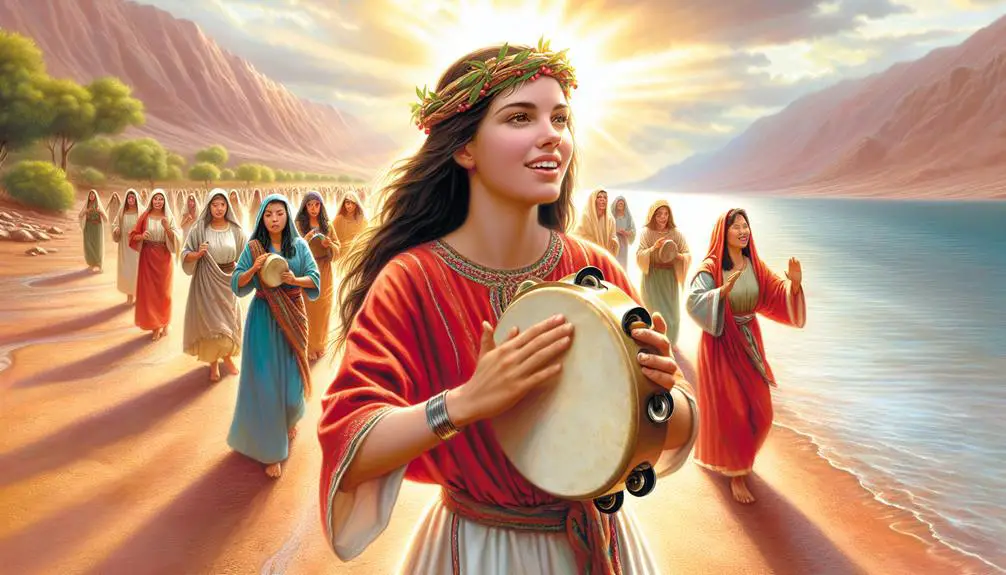
In the narrative of biblical worship, Miriam emerges as a pivotal figure, her act of praise after the crossing of the Red Sea marking a foundational moment in the religious expression of the Israelites. As you delve into her story, you'll find that Miriam's leadership showcases the significance of female leadership within a specific cultural context, challenging the traditional norms of her time.
Emotion |
Description |
|---|---|
Joy |
Miriam's song of praise, often referred to as the "Song of Miriam," is a spontaneous expression of joy and gratitude towards God for the deliverance of the Israelites from Egyptian bondage. |
Empowerment |
Her role as a prophetess and leader exemplifies the empowerment of women in religious contexts, providing a model for female leadership that was both bold and assertive. |
Reverence |
The cultural context of her time did not typically afford women such prominent roles, yet Miriam's actions and her subsequent recognition demonstrate a deep reverence for her faith and her God, transcending societal norms. |
Miriam's act of praise wasn't just a personal moment of worship but a public declaration of faith and a communal call to worship. Her leadership in this act of praise not only solidifies her role as a key worship leader in the Bible but also places her among the earliest examples of female leadership in religious contexts. Her story, deeply rooted in cultural context, continues to inspire and challenge, highlighting the profound impact of women's roles in spiritual leadership and worship practices.
Deborah: A Song of Victory
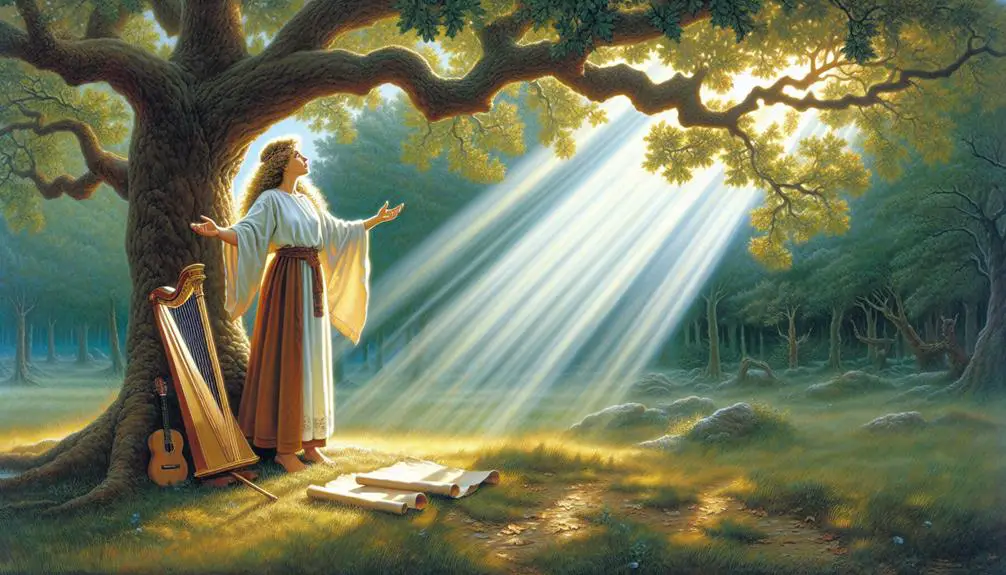
Within the tapestry of biblical narratives, Deborah's victory song stands as a compelling testament to her leadership and the divine favor bestowed upon her and the Israelite people. You observe in her story a blend of strategic acumen and spiritual depth, a combination that marks her as an exceptional figure among worship leaders in the Bible.
Deborah's role as both a prophetess and a judge in Israel sets the stage for her unique contribution to the nation's history. Her leadership qualities are evident in her ability to inspire confidence and unite the people under a common cause. When she receives the divine command to engage in battle against the Canaanites, her response embodies a profound trust in God's guidance, coupled with a clear-eyed assessment of the situation. Her battle strategy, though divinely inspired, also showcases her practical wisdom and understanding of warfare.
The song of victory that Deborah and Barak sing (Judges 5) further highlights her leadership qualities. It's not just a recount of their triumph; it's a theological reflection on the battle, attributing success to God while also acknowledging the contributions of the people. This song serves as a rallying cry for faith and obedience, reinforcing Deborah's role as a spiritual leader.
Her story encourages you to recognize the power of combining spiritual leadership with practical wisdom. Deborah's victory song isn't merely an artifact of ancient history; it's a blueprint for how faith and action can lead to monumental outcomes. Through her, you see the impact of integrating battle strategy with unwavering faith—a lesson as relevant today as it was in her time.
Frequently Asked Questions
How Did the Role of Worship Leaders Evolve From the Old Testament to the New Testament?
In exploring how leadership roles evolved, you'll notice a shift from the Old to the New Testament. Initially, leaders focused on Levitical duties, emphasizing rituals and temple worship.
Over time, there's a move towards a more prophetic influence, highlighting spiritual guidance and community leadership. This transition reflects a broader understanding of worship, from structured ceremonies to a more personal, communal relationship with the divine, showcasing the dynamic nature of religious leadership.
In What Ways Did Cultural and Historical Contexts Influence the Music and Worship Practices of Each Leader Mentioned?
You'll find that cultural and historical contexts deeply shaped music and worship practices. Ceremonial garments and architectural acoustics weren't just aesthetic choices; they were reflections of societal values and technological advancements.
These aspects influenced how communities engaged with music during worship, showcasing a rich tapestry of tradition and innovation. Understanding this evolution offers insights into the broader narrative of cultural expression and its impact on collective worship experiences.
Are There Any Recorded Instances Where Worship Leading Directly Impacted the Outcome of a Battle or Conflict in the Bible?
Yes, you're diving into a sea where divine intervention reshapes battle strategies.
In the Bible, one standout instance is when King Jehoshaphat placed singers in front of his army, praising God. This act of worship led to confusion among their enemies, who ended up destroying each other.
This story isn't just a tale; it's a profound example of how faith and worship can unexpectedly turn the tide in seemingly unwinnable battles.
How Do the Responsibilities and Expectations of Worship Leaders in Biblical Times Compare to Those of Modern Worship Leaders in Various Religious Traditions?
You're examining how the roles of worship leaders have evolved over time. Traditionally, they were seen as spiritual guides, with an emphasis on personality traits like humility and devotion.
Nowadays, expectations often include formal leadership training, blending ancient virtues with modern skills. This shift reflects broader changes in religious practices, where ancient responsibilities meet contemporary demands, highlighting an ongoing dialogue between traditional values and the requirements of modern congregations.
Can the Musical Instruments Mentioned in Relation to These Biblical Figures Be Linked to Any Contemporary Instruments Used in Worship Today?
You're diving into a sea of sounds, where ancient instruments are the ancestors of today's worship genres. Instrument origins trace back to biblical times, revealing a direct lineage to contemporary worship tools.
This analysis uncovers how lyres and harps have evolved into guitars and keyboards, bridging centuries of musical worship. It's a scholarly exploration, detailing how these ancient sounds have shaped modern worship, echoing through time to today's diverse religious practices.
Conclusion
In sum, from Moses's melodies of liberation to David's devout ditties, and Asaph's authoritative anthems to Miriam's prophetic praises and Deborah's victorious verses, these worship leaders in the Bible blend belief with ballads.
Analytically, their songs serve not merely as spiritual soundtracks but as theological treatises, offering insights into divine-human dynamics.
Each leader's lyrical legacy, steeped in sacred scholarship, showcases the symbiotic synergy between worship and wisdom, faith and folklore, piety and poetry, setting a scholarly standard for sacred songcraft.


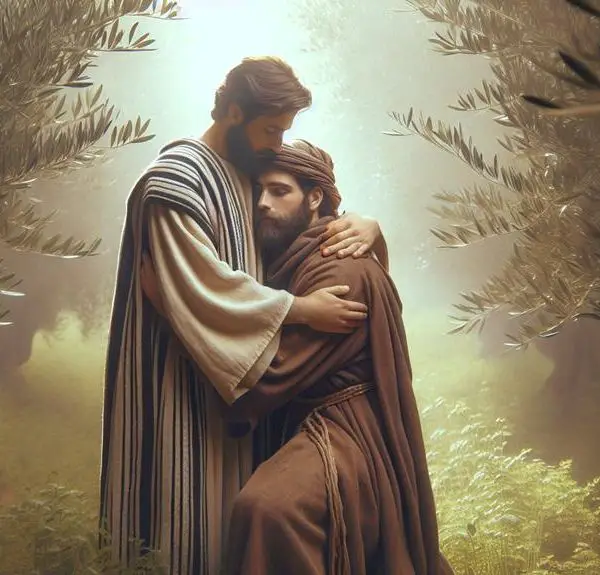
Sign up